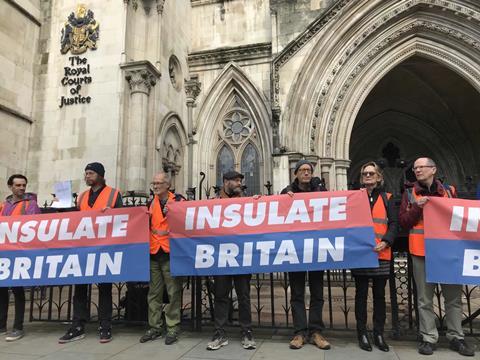As the global climate summit approaches, we ask leading figures in the profession and wider industry to share one idea they think could help save the planet

Insulate Britain with a national retrofit programme
Barbara McFarlane, partner at The McFarlane Partnership, and lecturer Suzy Nelson; both members of the Architect’s Climate Action Network
The campaign group Insulate Britain is highlighting the need for a comprehensive programme to retrofit UK homes to achieve the goal of net zero carbon emissions.
While some may question its tactics, few can disagree with the objective. We have among the oldest and least energy-efficient homes in Europe, and almost 20% of UK carbon emissions come from energy used in homes.

Without a mass programme to improve the insulation of our homes and to switch to low-carbon heating, we cannot reach net zero. And despite government rhetoric about tackling climate change, we have only had half-hearted botched programmes like the failed Green Homes Grant. In the Architect’s Climate Action Network, we are trying to inform the wider public about the need for urgent action to retrofit our homes with our campaign Householders Declare.
The RIBA pointed out in its recent report on the climate and ecological emergency that, even if all current Paris agreement climate pledges are met, global temperatures will still rise about 2.4°C by the end of the century. To avert climate disaster, we urgently need public investment to build up the capacity to deliver improvements on the scale needed.

The industry must come together to campaign for a comprehensive government-supported programme to decarbonise our homes. There is a growing consensus: the RIBA, the RICS, the New Economics Foundation, the Construction Leadership Council and the Federation of Master Builders have all produced reports making the case for a national retrofit programme.
While the scale of public investment required is considerable, our government is able to find resources when it recognises a crisis. In the context of the pandemic in 2020/21, it borrowed an additional £339bn, according to the Institute of Government. And improving the energy efficiency of our homes has benefits beyond the climate: the Construction Leadership Council estimates that a retrofit programme will create 500,000 skilled jobs, while warmer homes will reduce demand on the NHS by preventing excess winter deaths, which cost £1.4bn annually.

We need to campaign for long-term public investment in a retrofit programme, which will ensure all homes are energy-efficient and not dependent on fossil fuels. The programme should be front-loaded to kickstart the supply chain and prioritise the homes of people suffering fuel poverty.
A national taskforce should be set up to direct the programme, with regional centres established to oversee delivery. Considerable investment in training professionals and tradespeople will be essential. In tandem with this, strong consumer protection is needed as well as strengthening building regulations with increased standards of insulation and safeguards to prevent risk of fire and damage from moisture.
Postscript
Barbara McFarlane is a director of The McFarlane Partnership. Suzy Nelson is a retired architect and former principal lecturer in urban and regional planning at Westminster University. Both are members of the Architects Climate Action Network (ACAN) existing buildings group.
















1 Readers' comment